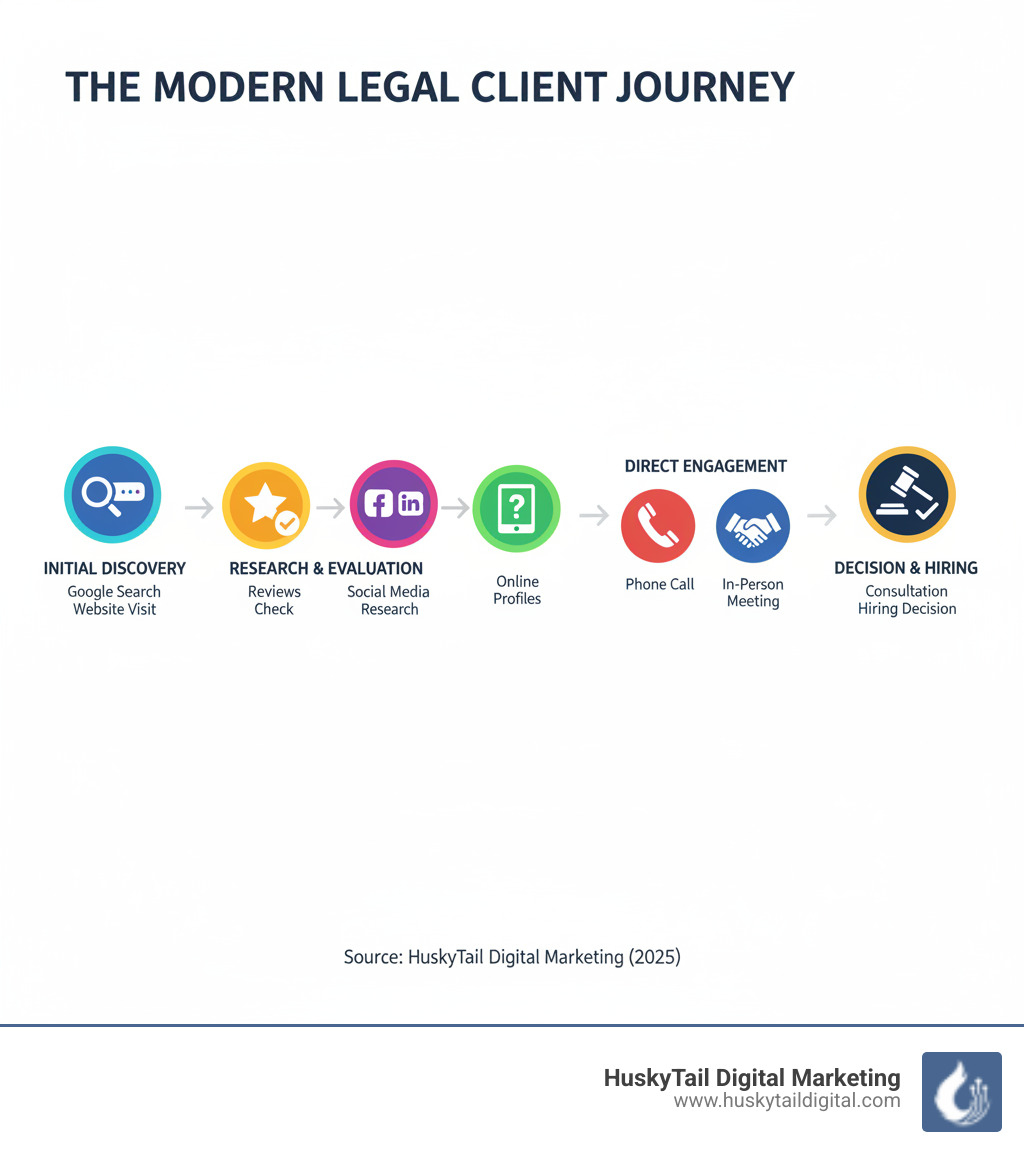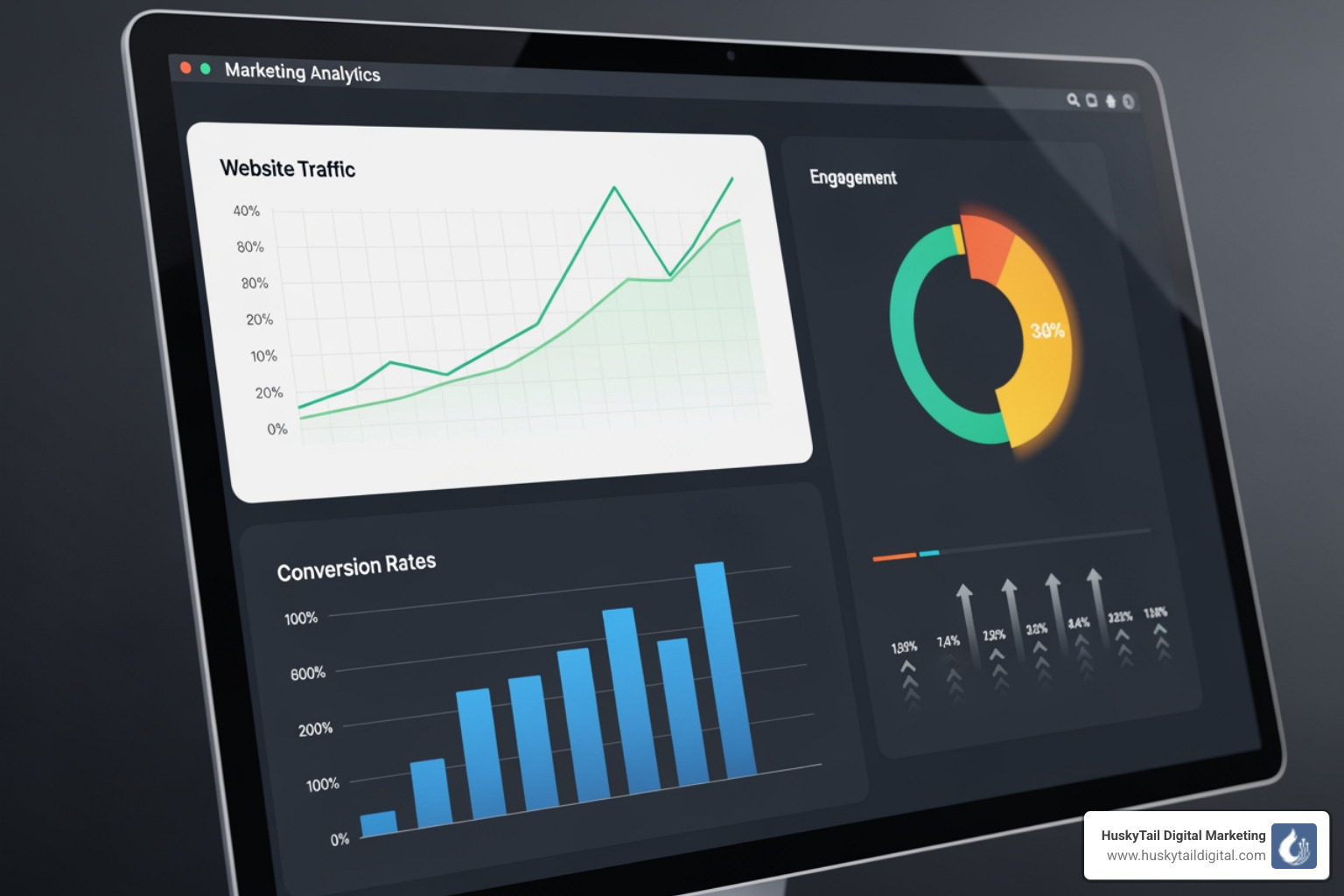Why Getting More Legal Clients is Critical To Your Firm's Success
Get more legal clients—it's a top priority for every law firm. In today's competitive market, being a great lawyer isn't enough. You need a strategic, multi-channel approach to connect with prospective clients actively searching for legal help.
Here's how to get more legal clients in 2025:
- Build a powerful online presence with a professional website and optimized Google Business Profile
- Dominate local and organic search through SEO and content marketing
- Leverage paid advertising (PPC) for immediate visibility and targeted reach
- Generate referrals through exceptional service and strategic relationship-building
- Network actively within professional associations and your local community
- Manage your online reputation by encouraging reviews and responding professionally
- Measure and refine your marketing efforts based on data and ROI
The stakes are high: 96% of people now begin their search for legal help online. If your firm isn't visible in those critical first moments, you're losing potential clients to competitors.
The good news is that getting more clients requires clarity and consistency, not a massive budget. It's about meeting people where they are—online, in your community, and through trusted referrals.
I'm Stephen Gardner, founder of HuskyTail Digital Marketing. With over 20 years of experience, I've helped law firms grow using strategic SEO and AI-driven marketing. This guide shares proven strategies combining digital excellence with relationship-building to help your practice thrive.

Step 1: Build A Powerful Foundation For Client Attraction
Before you can get more legal clients, you need a solid foundation. This foundation has three parts: defining your ideal client, creating a high-converting website, and optimizing your digital storefront so people can find you.
Let's dig into each one.

Define Your Ideal Client and Niche
You can't effectively market to everyone. Trying to be a generalist means you're a specialist to no one. Instead, focus on your ideal client. Understand their worries and what they search for when they need legal help.
Start with your practice area focus. Each niche—whether it's Family and Divorce Lawyers, Personal Injury Attorneys, Estate Planning Attorneys, Criminal Defense Lawyers, or Immigration Law Firms—has a specific audience.
Next, understand your client demographics: location, age, income, and what they value in an attorney—speed, compassion, or cost transparency.
Most importantly, identify their pain points. A personal injury client faces medical bills, while an estate planning client fears for their family's future. Understanding these struggles allows you to speak directly to their needs in your marketing.
This understanding helps you develop your Unique Value Proposition (UVP)—what makes you different. Developing your firm's unique value proposition is worth the effort. Your UVP could be "compassionate guidance for families in crisis" or "aggressive representation that insurance companies respect."
Specializing in a niche makes you the go-to expert, building trust more easily than a generalist approach.
Create a High-Converting Law Firm Website
Your website is your digital first impression and must be effective. A clean, modern, and easy-to-steer design is crucial, as it guides visitors to take action.
Use clear calls-to-action (CTAs). Place obvious buttons like "Schedule a Free Consultation" or "Call Us Now" to make the next step clear.
Mobile performance is critical: 74% of users are more likely to return to a mobile-friendly site, as 60% of potential clients view your site on their phones. A poor mobile experience sends 40% of them directly to a competitor. We use a mobile-first approach to prevent this.
Page speed is also a deal-breaker. Since 53% of users will abandon your site if it takes longer than three seconds to load, we aim for load times under that threshold.
Your site needs dedicated practice area pages written in plain language and detailed attorney bios that showcase your expertise and personality to build trust.
Behind the scenes, we implement Technical SEO fundamentals like proper site structure, clean code, and schema markup to ensure search engines can find and understand your site.
Optimize Your Google Business Profile (GBP)
When someone searches "lawyer near me," your Google Business Profile (GBP) is often the first thing they see. It's your digital storefront and critical for local visibility.
Over 1,382,200 people search for "a lawyer nearby" in the US every month. An unoptimized GBP makes you invisible to them.
Claim and verify your profile, then ensure NAP consistency (Name, Address, Phone number) across the web. Discrepancies confuse Google and hurt your rankings.
Clearly define your service areas and upload high-quality photos of your office and team to increase engagement.
Proactively use the Q&A section to answer common questions like "Do you offer free consultations?" or "What areas of law do you practice?"
Use Google Posts to share firm updates, legal tips, or community involvement. This signals to Google and clients that your firm is active.
Reviews are vital to your GBP. Our goal is to generate at least 10-20 meaningful monthly interactions (clicks, calls, etc.) on your profile. Higher engagement leads to better visibility.
With these foundational pieces in place, you're ready to get more legal clients through the strategies we'll cover next.
Step 2: Dominate Digital Marketing To Get More Legal Clients
With a solid foundation, it's time to connect with potential clients through digital marketing. These strategies are designed to bring your firm directly to those who need your services.

How to Get More Legal Clients with SEO and Content Marketing
Search Engine Optimization (SEO) aims to rank your website higher on Google. Since 90% of people never click past page 1, ranking in the top three spotswhich command 54.4% of all clicksis transformative.
For law firms, Local SEO is vital, connecting you with clients in your area searching for specific legal services like "personal injury lawyer Los Angeles."
Content marketing establishes your expertise and builds trust. Blogging is highly effective: businesses that blog get 55% more website visitors. With 77% of Internet users reading blogs, it's a clear opportunity. Content marketing also generates conversion rates six times higher than other methods.
We create content aligned with Google's E-E-A-T (Experience, Expertise, Authoritativeness, Trustworthiness) guidelines, publishing articles and FAQs that answer client questions in simple terms. Our Estate Planning SEO Ultimate Guide provides a niche-specific example.
Video marketing, which makes up 82% of Internet traffic, is a powerful tool for building personal connection and trust. Use it to answer common questions and offer legal insights.
Finally, Link Buildingacquiring links from reputable sitessignals to Google that your site is a valuable resource, boosting your rankings and aiding Attorney Lead Generation.
Implement Paid Advertising (PPC) for Immediate Reach
While SEO is a long-term strategy, Paid Advertising (PPC - Pay-Per-Click) offers immediate visibility and is the fastest way to get more legal clients quickly.
Google Ads are effective for targeting high-intent keywords like "criminal lawyer Phoenix." While legal keywords can be expensive, a well-managed campaign can be highly effective. We aim for a 7%-10% conversion rate for legal services, turning investment into new clients.
Social media advertising on Facebook and LinkedIn allows for precise targeting based on demographics, interests, and life events, ensuring your ad budget reaches the most relevant audience.
Effective PPC requires optimized landing pages, diligent budget management, and ROI measurement. Our experienced team manages campaigns across the country, from Atlanta to San Diego, to ensure your ad spend translates into real business growth.
Use Social Media to Build Authority and Engage Prospects
With 5.41 billion people on social media, your clients are there. Social media amplifies your brand, extends your content's reach, and builds credibility.
The key is choosing the right platforms. LinkedIn is ideal for B2B and corporate law, allowing you to establish authority and connect with peers. Understanding how the LinkedIn algorithm works is key to maximizing reach.
Facebook's massive reach (3.07 billion users) is perfect for community engagement, sharing content, and showcasing your firm's culture to build trust.
We help you repurpose content, share ethical wins, and showcase your firm's human side. The goal is to build a community, foster trust, and stay top-of-mind. Social media plants the seeds for relationships that lead to clients over time.
Step 3: Leverage Relationships For Sustainable Growth
After two decades in legal marketing, I've learned that the best client acquisition strategy is about being remembered through genuine human connection. The most valuable clients come from relationships—referrals, networking, and community reputation. These strategies create sustainable growth that paid advertising alone can't match.

How to Get More Legal Clients Through Referrals and Testimonials
A powerful statistic: 62% of people get lawyer recommendations from a friend, colleague, or family member. When facing a legal challenge, people turn to those they trust.
Referred clients are incredibly valuable: they have a lifetime value 25 times higher, are 18% more loyal, and have a 37% higher retention rate. A solid referral network is the backbone of a thriving practice.
To cultivate this, create a structured referral program. A simple thank-you note can be powerful. Where ethically permitted, consider small tokens of appreciation like a gift basket or a donation to charity to acknowledge their trust.
Build relationships with professionals in complementary fields like accounting, finance, and real estate. These partnerships create a referral ecosystem where everyone, especially the client, wins.
Online reviews are the digital form of word-of-mouth. A staggering 82% of legal consumers read online reviews, and 53% of potential clients won't even consider your firm if you don't have at least a four-star rating.
We help clients develop ethical strategies for requesting reviews from satisfied clients. The key is good timing and making the process easy. Showcase these testimonials on your website, Google Business Profile, and social media to build trust.
Network Effectively and Join Professional Associations
Effective networking isn't about collecting business cards; it's about building genuine relationships that lead to opportunities. In competitive markets like Chicago or Las Vegas, effective networking opens up new client relationships 70% of the time because people who know, like, and trust you will think of you first.
Become an active member of local bar associations and civic groups. Volunteer, contribute, and become a recognized, respected member to connect with valuable referral sources.
Industry events and seminars allow you to learn and engage with potential clients and referral partners. Informal conversations are often the most valuable.
Public speaking opportunities, like free workshops for local groups, position you as an expert and build trust quickly by demonstrating your knowledge.
Pro bono work not only gives back but also expands your network. The ABA offers resources for pro bono opportunities, and various organizations provide ways to contribute your skills and connect with the community.
Genuine community involvement establishes you as trustworthy and client-centric, building a reputation more valuable than any ad budget.
Manage Your Online Reputation Like a Pro
Your online reputation is often the deciding factor for potential clients. 82% of legal consumers read reviews, and 53% require at least a four-star rating before contacting a firm.
We help clients monitor online mentions across platforms like Google, Yelp, and Avvo. Knowing what's being said is the first step to managing your reputation.
Our golden rule is to respond to every review within 24 hours. A genuine thank-you for positive reviews shows you appreciate feedback.
For negative reviews, demonstrate professionalism. Respond calmly, acknowledge their concerns, and offer to resolve the issue offline. Never get defensive in a public response.
Potential clients scrutinize your responses to negative reviews. Handling criticism with grace builds trust by showing you are responsive and solution-oriented.
Maintaining a four-star or higher rating is an active strategy to get more legal clients. Positive reviews and professional responses to criticism create a reputation that attracts your ideal clients. In today's market, your online reputation and personal relationships are two sides of the same coin, both essential for sustainable growth.
Step 4: Measure, Refine, And Uphold Ethical Standards
After building your foundation and marketing channels, the next step is to measure results and uphold ethical standards. This separates thriving firms from struggling ones. Marketing without measurement is directionless, and marketing without ethics is a path to professional trouble.
Track Your Marketing ROI and Key Metrics
To get more legal clients consistently, you must know what's working. We advocate a data-driven approach instead of just hoping for results.
Track website traffic sources (Google, social media, ads) and conversion rates—the percentage of visitors who contact you. Aim for a 2-5% conversion rate for legal websites.
Track your cost per lead and compare it to your client lifetime value. A $100 cost per lead is sustainable if that client generates $10,000 in fees.
We use tools like Google Analytics and SEMrush to track performance and analyze competitors. Regular SEO Audits uncover issues holding your site back.
Review your marketing performance quarterly to spot trends and adjust strategies. Set SMART goals, such as: "Increase estate planning consultation requests by 30% in 90 days via content marketing and local SEO improvements."
These key performance indicators (KPIs) show whether your efforts to get more legal clients are paying off.
Uphold Legal and Ethical Marketing Standards
Equally important is marketing the right way. As a legal professional, your marketing must comply with State Bar advertising rules and ethical guidelines.
This means avoiding false or misleading claims, respecting client confidentiality, and maintaining professional responsibility in all marketing materials.
Each state has specific rules. Compliance with specific ethical guidelines is fundamental to protecting your license and reputation.
At HuskyTail Digital Marketing, we work with firms nationwide—from New York to California—and are well-versed in these ethical rules. We ensure every campaign is effective and compliant with bar association standards.
Our commitment is to help you get more legal clients while upholding your profession's integrity. Great marketing and ethical practice are both essential for long-term success.
Frequently Asked Questions About Getting Legal Clients
Here are straightforward answers to common questions we hear from law firms looking to grow.
What is the most effective way for a new solo lawyer to get their first clients?
For new solo lawyers, the key is to be strategic, not to have a massive budget. Start with your personal network. Inform friends, family, and former colleagues about your new practice and ask them to spread the word. Since 62% of people get lawyer recommendations from friends and family, these connections are invaluable.
Simultaneously, build your foundational online presence. A professional website and a fully optimized Google Business Profile are critical for appearing in local searches like "lawyer near me." With over 1.3 million such searches monthly in the US, this local visibility can be a major source of your first clients.
This combination of personal outreach and smart digital fundamentals provides both immediate opportunities and long-term visibility, offering the fastest path to your first clients.
How much should a law firm budget for marketing?
The right marketing budget depends on your firm's growth stage. For growing law firms, a good rule of thumb is to allocate 7-10% of your gross revenue goal to marketing. This invests in your future growth, not just your current status.
For a $500,000 revenue goal, a budget of $35,000 to $50,000 would cover website costs, digital ads, SEO, and agency fees.
New solo practitioners can start with $1,000 to $2,000 per month for essentials like a good website, Google Business Profile optimization, and some targeted local SEO. As you grow, scale your investment based on ROI, tracking your cost per lead and client lifetime value.
Is digital marketing better than traditional networking for lawyers?
Asking whether digital or traditional marketing is "better" is the wrong question. You need both to be effective.
Digital marketing offers incredible reach and precision, putting you in front of clients actively searching for legal help online. With 96% of people searching for legal help online, it's essential.
But traditional networking and referrals build deep, personal trust that ads cannot. A personal recommendation is powerful, and referred clients have a 25x higher lifetime value and are 37% more likely to stick with you.
The most successful firms integrate both. They combine an optimized online presence with traditional networking. Research shows that this integrated approach can lead to a 400% improvement in online performance. The two strategies amplify each other to consistently get more legal clients.
The bottom line: integrate both into a cohesive strategy to meet potential clients wherever they are.
Conclusion: Your Blueprint For Sustainable Firm Growth
Building a thriving law practice takes time and the right strategy. This guide provided a blueprint to help you get more legal clients by building a solid foundation, using digital marketing, leveraging relationships, and measuring results ethically.

There is no magic bullet. Success requires consistent effort and an integrated strategy combining digital excellence with traditional relationship-building. Thriving firms adapt to the competitive, evolving market and maintain a client-centric approach.
Your marketing must address both how clients search and how they hire: 96% of people start online, but 62% hire based on a referral. This means your website, Google Business Profile, and content must be excellent, and your relationships must be strong.
For over 20 years, HuskyTail Digital Marketing has helped law firms in cities across the US, including Atlanta, Austin, Boston, Chicago, and Los Angeles, achieve sustainable growth. Our AI Powered SEO Strategies combine technology with a human touch to deliver data-backed results and bring clients to your door.
We are also proud of our Hearts for Huskies program, reflecting our belief that great marketing can also do good.
Ready to get more legal clients? Explore our specialized marketing services for the Legal Industry and let's build your blueprint for success together.
-p-1080.webp)


.avif)









.webp)
.avif)
.avif)

